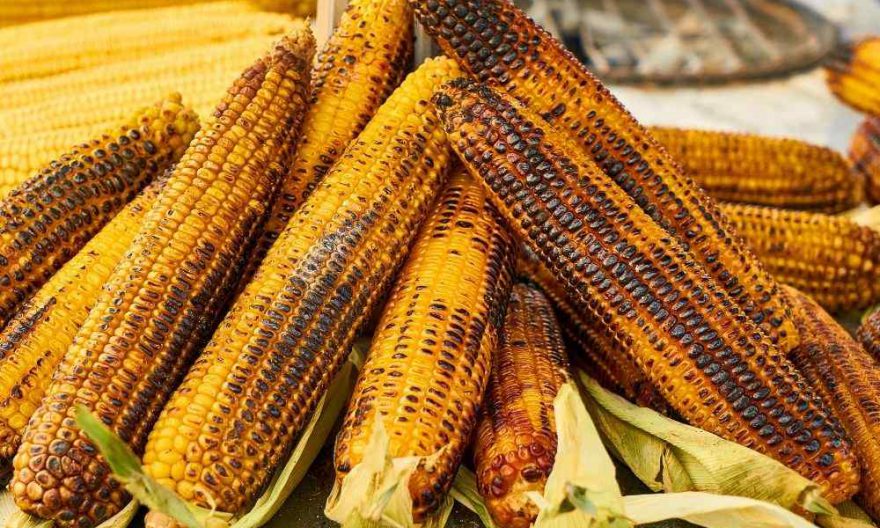
This Ethiopian year, the rains have come a little bit late. Usually, the rainy season known as Kiremt in Amharic, sets in the early days of June. This year, the first drops started to fall almost at the end of June and now it is raining cats and dogs as the saying has it. Seasons force on us particular habits and lifestyles. The rainy season is usually cold and our clothing and eating habits change in response to the climatic change. Shirts give way to thicker fabrics like sweaters and jackets. Many heads are covered with hats and other head gears while hot corn and potato may be the preferred foods and coffee or tea the drinks of choice for many people.
In Ethiopia, change of seasons is closely related to change in the food items people are prone to enjoy for one reason or another. The streets of Addis can be taken as barometers to measures the culinary tastes of pedestrians in the busy quarters of the budding city. Among the agricultural products that are loaded on trucks and make their way straight into the city, corn and potato have no equals. Even before the rains start to fall, fresh corn from the farms around the capital as well as from distant farming communities start to make their presence felt in busy intersections and the crowded slums of Addis Ababa.
By the way, most of the corns and potatoes are loaded on the back of trucks and minibuses and make the long journey in the night from the south and reach the capital at dawn where they are unloaded and delivered to wholesalers and retailers who in turn sell them to thousands of young women who roast or boil them before they offer them to eager consumers.
Why corn or potato roasted on glowing coal fire or boiled in huge barrels, suddenly becomes the number of diet of ordinary people in Ethiopia is not a mystery. From the point of view of nutrition science, corn is stuffed with carbohydrate and is used by human body to generate energy in a very economic way. One can obtain the same results with more expensive foods but corn is usually the diet of the poor with which they fight the cold in the rainy mornings and evenings while on the street or taking shelter from the downpours.
The second reason that makes corn a kind of natural fuel that heats bodies during the rainy season is perhaps its relatively low price. As food prices are shooting through the ceilings and meat and other dietary luxuries are becoming less and less affordable to the less privileged members of society, corn and its remote cousin potato, come to the rescue. In the old days, when there were less consumers and abundant production of these food items, prices were ridiculously low and anyone could enjoy them quite easily. Still now, when food prices are unbelievably high, one serving of corn or potato usually costs ten Birr and that is considered relatively cheap. White bread is more expensive than corn or potato these days.
Corn and potato are not only cheaper than any other food item during the rainy season. They are also serving as “fast foods” to many people who travel from work to home while the rains are battering the streets. The “fast food” joints at busy spots along the streets are managed by many young damsels who sit beside coal fire, roasting or boiling the corn or potato and selling it to eager pedestrians who consume them on the spot while they are still hot and savory. The busy street side spots where these foods are usually chaotic.
The steam rising from the big containers where corn or potato are boiling dissolves in the cold air while buyers push and shove one another as they exchange coins and paper money for hot chunks of potato. Hand hygiene is not an issue under these circumstances. Those places are usually littered with all kinds garbage of leftovers and sheathes of corn and peels of potato and no one seems to care about them. The urgent concern is usually to get something to put in the mouth and alleviate the hunger pangs caused by the rains and the accompanying cold.
In Addis Ababa, the rainy days bring not only food for the body but also for the mind. Although it is inconvenient to sell and buy books or any other reading materials in the rain, ambulatory book sellers are roaming the streets carrying their bundles on their arms covered with plastic sheet to protect them from rain water. Why hot potato and roasted corn are the preferred foods of pedestrians but why books become the preferred foods of the mind is quite intriguing to understand. Maybe our brains need some kind fuel from reading books in order to better absorb the glucose from corn or potato. This may sound quirky or may be true although science may not have some clue as to the connection between the cold, corn, potato and the brain that processes all these items. For now let us limit ourselves to the truism that books are food for the mind while corn and potato are good sources of fuel for the body.
Speaking of books why they enjoy greater demand during the rainy seasons has always intrigued me. Yet, the answers to my queries are simple. People tend to stay at home when it rains and they need to do something while they are idle and books come in handy to “kill time” as many of them say. I would rather say to use time in a pleasant and useful way. As a result of this, my recommendation to anyone trying to have a good time during a bad cold and rainy day might to eat hot corn or potato washed down with equally hot coffee while holding a good book in your hand.
Then comes coffee, the ubiquitous drink of Ethiopians of all ages and classes. Last day, I read in one of the blog pages that the price of coffee is rising steadily in the world market. The next day I realized that it has risen even here in the birthplace of coffee when I bought half a kilo of ordinary coffee beans for 110 Birr. But this has not prevented people from enjoying their most preferred drink in this rainy season. The street side coffee joints are as busy as during the summer months.
There are tons of medical, economic, historical and anthropological literatures dealing with coffee which is a big global subject although it looks simple and ordinary when we sip it in the morning after our meals. Coffee can also assume a particular importance during the rainy and cold season as a means of fighting mood swings or depressive tendencies. Coffee is known as a mood booster or energizer and it comes handy during the season of cold when our need for both good mood and energy is elevated.
That may be why open air coffee shops are crowded with people who are feeling the biting cold and need something to warm themselves with. There may also be many depressed and anxious souls among them. By the way, why many people prefer coffee over tea is no mystery either. The price of sugar is “untouchable” by many disadvantaged citizens and it is mostly unavailable in ordinary shops including those ran by neighborhood consumer associations. And when it is available, it is very expensive. This is not because we export sugar but because of the ever widening gap between demand and supply as pundits often warn. Most of the sugar available in the market is imported from abroad as most of the wheat that goes into baking breads. If we go by the gossips circulating around the sugar consuming public, the shortage is due partially to the so-called “greedy dealers” or the “secret pact” between sugar importers and distributors who fix prices at random in order to maximize their profits. This may be true or just empty gossips as long as we have no supporting evidence. Moreover such gossips do little to alleviate public anxieties about the rising prices of consumer goods.
The health benefits of coffee are well-established while the health perils of sugar are equally uncontested. Nevertheless, people keep on sweetening their coffee and tea with sugar irrespective of the costs in health or wellbeing. By the way one of the secrets of our love affairs with sugar may be its chemical quality as a source of glucose that goes into fueling our brains and bodies. The medics tell us that sugar becomes a health hazard when consumed without restraint. The folk saying that even honey turns sour when consumed in great quantity can be instructive in this context.
Anyway, when it comes to fighting the cold in this rainy season both coffee and tea seasoned with a fair amount of sugar can provide a temporary protection and sense of wellbeing, that is to say if consumed in moderation. We are now just at the beginning for the rainy season and we may enjoy many surprises as the cold, the rains, high food prices and sugar and coffee increasingly become the preferred talking points of the shivering public. Reading books may or may not be cause for comfort but as an old philosopher once said, men have to eat before they engage in anything that touches the mind.
BY MULUGETA GUDETA
The Ethiopian Herald 23 July 2021





